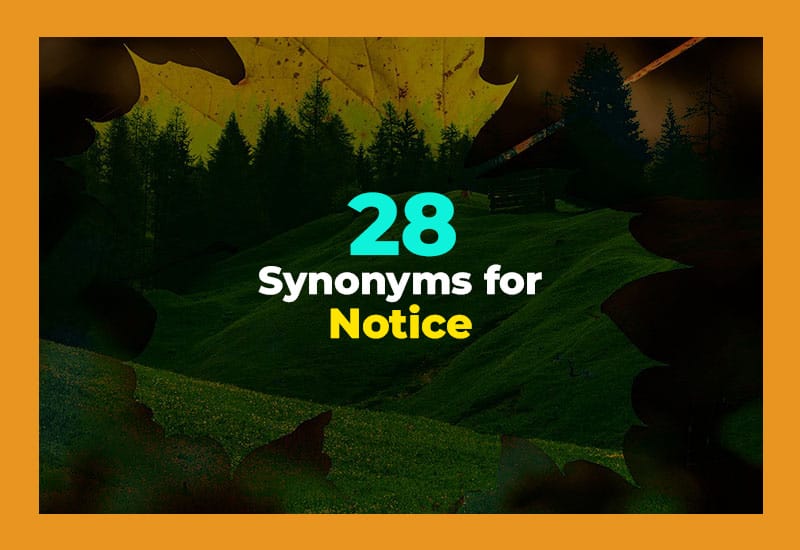You know that feeling when you suddenly spot something interesting? Maybe a friend's new haircut or a bird singing outside. That's what notice is all about — paying attention! Let's explore some cool words that mean notice. These words can make your speaking and writing more fun and colorful. Ready to dive in? Let's go!
1. Observe
To observe means to carefully watch or look at something. When you observe, you pay close attention to details. For example, a scientist might observe how plants grow over time. Or you could observe your friend's smile and notice they look happy. Observing helps you understand what is happening around you. It's more than just seeing; it means really looking carefully. People observe things in nature, people's actions, or even small changes in a room. You use this word when you want to say someone is watching with interest or care.
2. Detect
Detect means to find or discover something, often something hidden or hard to see. For example, a doctor might detect a small problem in your health before it gets worse. Or a smoke alarm detects smoke and tells you there's a fire. Detecting is like using your senses or tools to notice something important. It's not always easy to see what you detect, but it's important. Detect is often used in detective stories when someone finds clues or in science when people find small changes or signals.
3. Spot
Spot means to see or notice something quickly, especially something not easy to see. For example, you might spot your friend in a crowd or spot a bird in a tree. It's a fast and sudden noticing. People spot things when they look carefully but briefly. You can spot differences between two pictures or spot a mistake in a paper. Spot is a casual and fun word that means to notice something with a quick look or glance.
4. Recognize
Recognize means to know or remember something or someone you have seen before. For example, you might recognize a teacher from last year when you see them again. It means you notice something familiar. Recognizing can also mean seeing a problem or situation clearly. For example, you recognize that it is going to rain by looking at dark clouds. This word shows you understand or identify what you see because it is known to you.
5. Perceive
Perceive means to notice or become aware of something, especially through your senses. For example, you might perceive a sweet smell in the kitchen or perceive someone's sadness by their voice. It's about understanding what you see, hear, or feel. Perceive is a bit more about the way your mind understands things, not just seeing them. It's how you take in information from the world around you and make sense of it.
6. Detect
Detect means to find or discover something, often something hidden or hard to see. For example, a doctor might detect a small problem in your health before it gets worse. Or a smoke alarm detects smoke and tells you there's a fire. Detecting is like using your senses or tools to notice something important. It's not always easy to see what you detect, but it's important. Detect is often used in detective stories when someone finds clues or in science when people find small changes or signals.
7. Discern
Discern means to see or understand something clearly, especially when it is not easy. For example, you might discern a faint sound in the distance or discern the truth in a confusing story. It's about noticing small differences or details that others may miss. Discern shows that you have good judgment and attention. It's a smart way to say you notice things carefully and clearly, even if they are not obvious.
8. Glimpse
Glimpse means to see something for a very short time or only partly. For example, you might catch a glimpse of a movie star walking by or glimpse a rainbow after rain. It's a quick, small notice, not a full look. Glimpse feels a little like a sneak peek or a brief moment of seeing. It's used when you don't see something fully, but just enough to notice it.
9. Note
Note means to pay attention to something and remember it or write it down. For example, you might note your homework in a notebook or note that your friend looks tired. It means you notice something important and keep it in your mind or on paper. People use note when they want to remind themselves about details or when they observe something for future use.
10. Mark
Mark means to notice or show something important or special. For example, you might mark your birthday on the calendar or mark an important sentence in a book. It's about recognizing and highlighting something. Mark can also mean to pay attention to a point or place. It's a way to say you notice something and make it stand out.
11. Witness
Witness means to see something happen, especially an event or accident. For example, you might witness a car accident or witness a beautiful sunset. It means you were there and saw what happened. Witness is often used in serious situations or stories, but it can also mean seeing something special. It shows you were paying attention to an event.
12. Detect
Detect means to find or discover something, often something hidden or hard to see. For example, a doctor might detect a small problem in your health before it gets worse. Or a smoke alarm detects smoke and tells you there's a fire. Detecting is like using your senses or tools to notice something important. It's not always easy to see what you detect, but it's important. Detect is often used in detective stories when someone finds clues or in science when people find small changes or signals.
13. Glance
Glance means to look quickly or briefly at something. For example, you might glance at the clock to see the time or glance at your phone for a message. It's a quick notice without deep attention. Glance is used when you want to say someone saw something fast or with only a short look. It's a casual way to say you noticed something, but not carefully.
14. Eye
Eye means to look at something carefully or with interest. For example, you might eye a delicious cake before eating or eye a new gadget in the store. It shows you notice something and maybe want it. Eye is a fun, informal word that means to watch something closely. It's often used when you look at things with curiosity or care.
15. Spy
Spy means to secretly watch or notice something, often without others knowing. For example, you might spy on birds in your backyard or spy someone hiding a surprise. It means watching quietly and carefully. Spy is a playful word that comes from secret agents, but people use it in everyday talk when they quietly notice something.
16. Detect
Detect means to find or discover something, often something hidden or hard to see. For example, a doctor might detect a small problem in your health before it gets worse. Or a smoke alarm detects smoke and tells you there's a fire. Detecting is like using your senses or tools to notice something important. It's not always easy to see what you detect, but it's important. Detect is often used in detective stories when someone finds clues or in science when people find small changes or signals.
17. Discern
Discern means to see or understand something clearly, especially when it is not easy. For example, you might discern a faint sound in the distance or discern the truth in a confusing story. It's about noticing small differences or details that others may miss. Discern shows that you have good judgment and attention. It's a smart way to say you notice things carefully and clearly, even if they are not obvious.
18. Glimpse
Glimpse means to see something for a very short time or only partly. For example, you might catch a glimpse of a movie star walking by or glimpse a rainbow after rain. It's a quick, small notice, not a full look. Glimpse feels a little like a sneak peek or a brief moment of seeing. It's used when you don't see something fully, but just enough to notice it.
19. Note
Note means to pay attention to something and remember it or write it down. For example, you might note your homework in a notebook or note that your friend looks tired. It means you notice something important and keep it in your mind or on paper. People use note when they want to remind themselves about details or when they observe something for future use.
20. Mark
Mark means to notice or show something important or special. For example, you might mark your birthday on the calendar or mark an important sentence in a book. It's about recognizing and highlighting something. Mark can also mean to pay attention to a point or place. It's a way to say you notice something and make it stand out.
21. Witness
Witness means to see something happen, especially an event or accident. For example, you might witness a car accident or witness a beautiful sunset. It means you were there and saw what happened. Witness is often used in serious situations or stories, but it can also mean seeing something special. It shows you were paying attention to an event.

I hope you had fun learning all these different ways to say notice! Using these words can make your speaking and writing more exciting and clear. Next time you see something interesting, try using one of these synonyms to describe it. You'll sound smarter and more creative, like a true word expert. Keep practicing and soon you will notice many things around you with fresh eyes. Words are powerful, and now you have many new tools to express yourself better!









